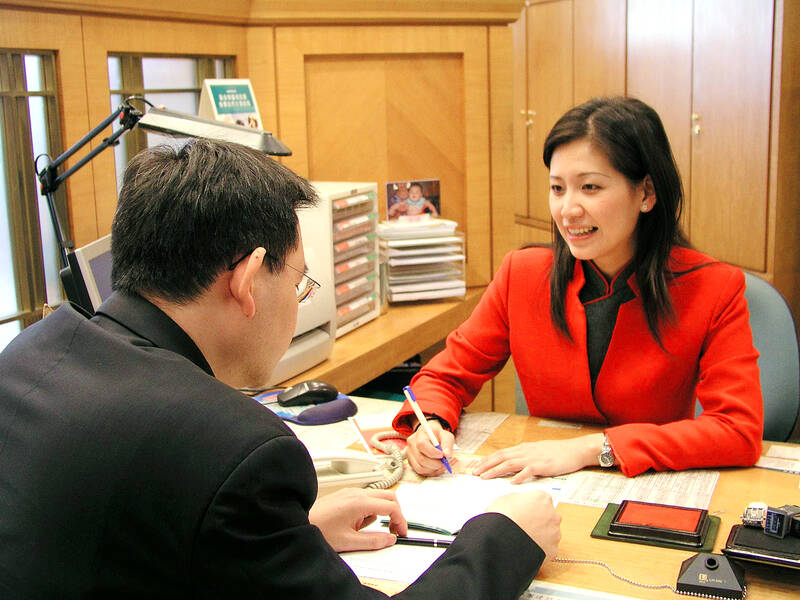Nearly 80 percent of Taiwan’s ultra-high-net-worth individuals (UHNWIs) are looking at wealth gains this year, with real-estate investment most likely to win their attention and inflation topping their list of risks, a survey by property consultancy REPro Knight Frank Taiwan showed yesterday.
The findings made super-rich Taiwanese more optimistic than their global peers, only 68 percent of whom are upbeat about wealth increase, research director Howard Zhan (詹宗煌) told a news conference in Taipei, defining UHNWIs as people with investable assets in excess of US$30 million.
Despite the financial turmoil and economic headwinds, 40 percent of super-rich people worldwide last year saw their assets increase, with 17 percent posting gains of more than 10 percent, Zhan said.

Photo: Lee Chin-hui, Taipei Times
That meant the remaining 60 percent saw their assets contract.
Taiwan’s UHNWIs fared worse last year, with only 26 percent seeing their wealth increase and 74 percent suffering losses, the survey showed.
Asked about risks ahead, 67 percent of the world’s super-rich named inflation as the biggest downside risk, followed by interest rate hikes at 59 percent, geopolitical tensions at 53 percent and recession at 13 percent, Zhan said.
As for opportunities, 46 percent of global UHNWIs favored investing in real estate, followed by technology businesses at 33 percent, equity markets at 28 percent and fixed-income products at 15 percent, the survey showed.
Real estate is the most favored option, because of its resilience to inflation, Zhan said.
Taiwan’s very wealthy people lag behind their regional and global peers in terms of real-estate investment appetite, with only 13 percent saying they intend to buy residential properties this year, compared with 16 percent for the Asia-Pacific area and 15 percent globally, Zhan said.
Taiwan’s UHNWIs own an average of 2.9 houses, compared with an average of 4.9 houses among their regional peers and 4.2 houses globally, the survey found.
In addition, 40 percent of the super-rich in Taiwan prefer owning real-estate properties overseas, higher than 26 percent among their peers in the region and 28 percent globally, it said.
Japan is the most popular target at 58 percent, followed by the US at 47 percent, Canada at 37 percent and Australia at 21 percent, the survey showed, adding that Singapore, Vietnam and the UK also rank high with more than 10 percent.
REPro Knight Frank Taiwan general manager Cliff So (蘇銳強) said that the ban on transfers of presale house contracts would make developers more cautious about launching new products and slow overall residential property transactions.
Demand for factory and office buildings would remain strong as companies shift production bases back to Taiwan, So said.

MULTIFACETED: A task force has analyzed possible scenarios and created responses to assist domestic industries in dealing with US tariffs, the economics minister said The Executive Yuan is tomorrow to announce countermeasures to US President Donald Trump’s planned reciprocal tariffs, although the details of the plan would not be made public until Monday next week, Minister of Economic Affairs J.W. Kuo (郭智輝) said yesterday. The Cabinet established an economic and trade task force in November last year to deal with US trade and tariff related issues, Kuo told reporters outside the legislature in Taipei. The task force has been analyzing and evaluating all kinds of scenarios to identify suitable responses and determine how best to assist domestic industries in managing the effects of Trump’s tariffs, he

TIGHT-LIPPED: UMC said it had no merger plans at the moment, after Nikkei Asia reported that the firm and GlobalFoundries were considering restarting merger talks United Microelectronics Corp (UMC, 聯電), the world’s No. 4 contract chipmaker, yesterday launched a new US$5 billion 12-inch chip factory in Singapore as part of its latest effort to diversify its manufacturing footprint amid growing geopolitical risks. The new factory, adjacent to UMC’s existing Singapore fab in the Pasir Res Wafer Fab Park, is scheduled to enter volume production next year, utilizing mature 22-nanometer and 28-nanometer process technologies, UMC said in a statement. The company plans to invest US$5 billion during the first phase of the new fab, which would have an installed capacity of 30,000 12-inch wafers per month, it said. The

Taiwan’s official purchasing managers’ index (PMI) last month rose 0.2 percentage points to 54.2, in a second consecutive month of expansion, thanks to front-loading demand intended to avoid potential US tariff hikes, the Chung-Hua Institution for Economic Research (CIER, 中華經濟研究院) said yesterday. While short-term demand appeared robust, uncertainties rose due to US President Donald Trump’s unpredictable trade policy, CIER president Lien Hsien-ming (連賢明) told a news conference in Taipei. Taiwan’s economy this year would be characterized by high-level fluctuations and the volatility would be wilder than most expect, Lien said Demand for electronics, particularly semiconductors, continues to benefit from US technology giants’ effort

‘SWASTICAR’: Tesla CEO Elon Musk’s close association with Donald Trump has prompted opponents to brand him a ‘Nazi’ and resulted in a dramatic drop in sales Demonstrators descended on Tesla Inc dealerships across the US, and in Europe and Canada on Saturday to protest company chief Elon Musk, who has amassed extraordinary power as a top adviser to US President Donald Trump. Waving signs with messages such as “Musk is stealing our money” and “Reclaim our country,” the protests largely took place peacefully following fiery episodes of vandalism on Tesla vehicles, dealerships and other facilities in recent weeks that US officials have denounced as terrorism. Hundreds rallied on Saturday outside the Tesla dealership in Manhattan. Some blasted Musk, the world’s richest man, while others demanded the shuttering of his